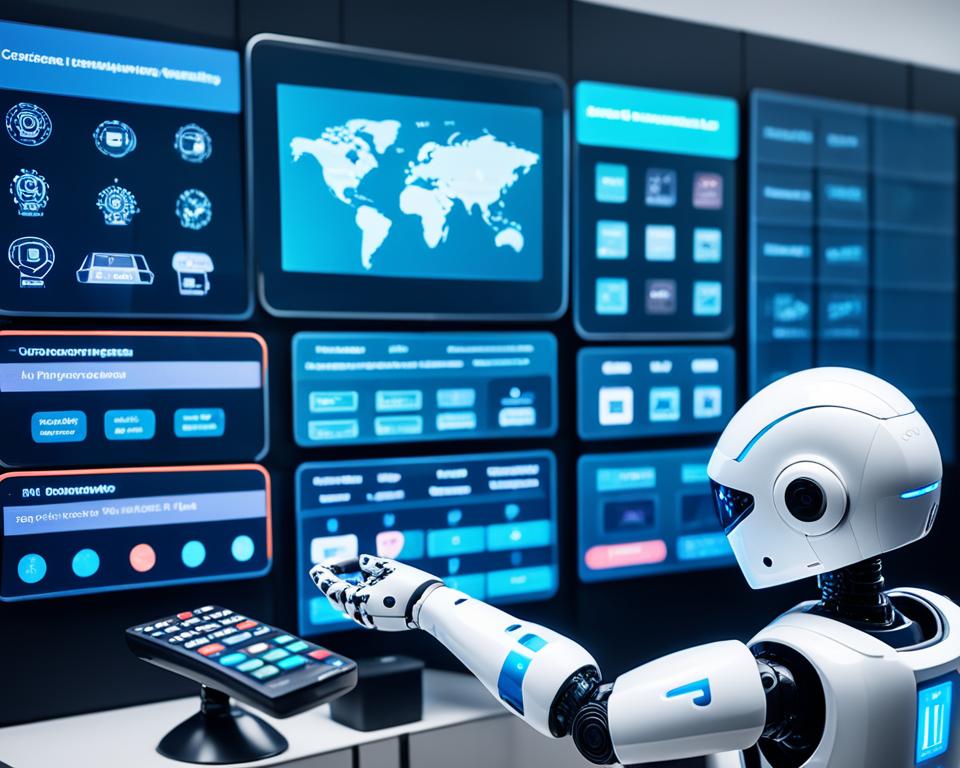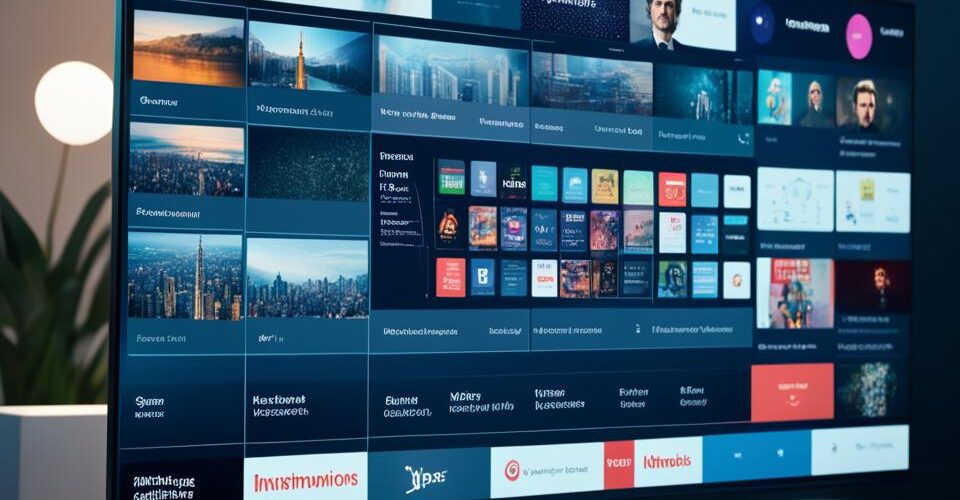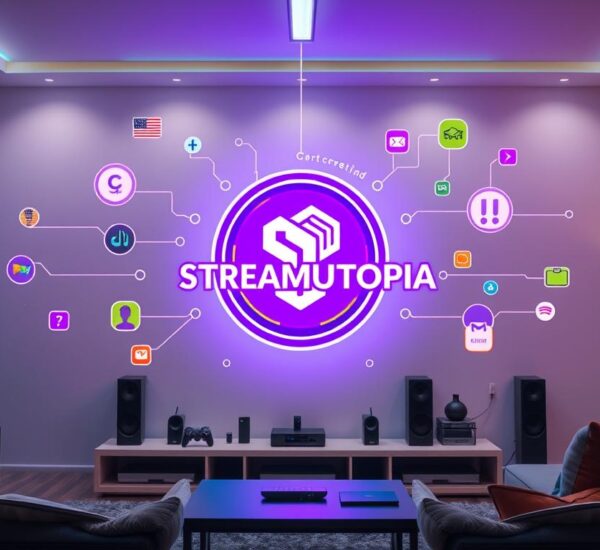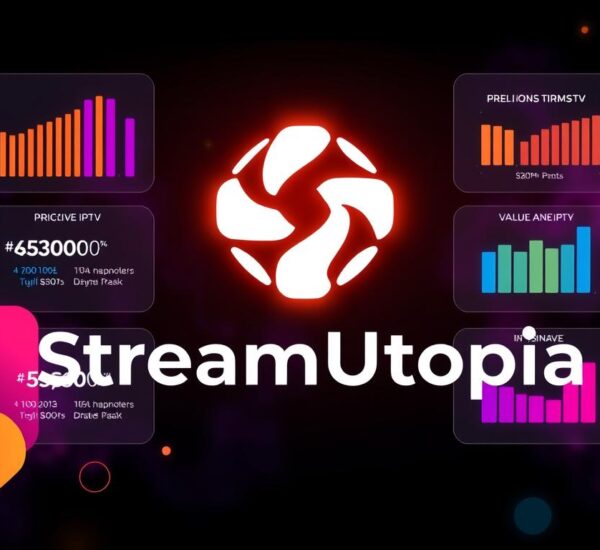Did you know that artificial intelligence (AI) is revolutionizing the world of IPTV recommendation systems? AI technology is making a significant impact by analyzing vast amounts of data and leveraging machine learning algorithms to enhance the viewing experience for users.
AI in IPTV recommendation algorithms has the power to optimize video quality, personalize content, reduce piracy, and generate rich metadata. By leveraging AI, service providers can deliver personalized and optimized content recommendations, driving user engagement and satisfaction.
Key Takeaways:
- Artificial intelligence (AI) plays a crucial role in enhancing IPTV recommendation systems.
- AI algorithms use machine learning to analyze data, identify patterns, and make predictions about user preferences.
- AI enables service providers to optimize video quality, personalize content, reduce piracy, and create rich metadata.
- By leveraging AI, IPTV providers can improve the viewing experience, drive user engagement, and deliver personalized content recommendations.
- The impact of AI on IPTV recommendation algorithms is shaping the future of the video industry.
The Importance of Video in AI and IPTV
Video is a fundamental component of both AI and IPTV. In the world of AI, video plays a crucial role in many popular applications, including self-driving cars and facial recognition. Similarly, in IPTV, where the focus is on television content, video takes center stage. Ensuring high-quality video is essential not only for a seamless user experience but also for accurate AI analysis.
IPTV poses unique challenges for AI algorithms. Different frame cadences and wide-angle shots require advanced processing and optimization techniques to deliver optimal video quality. AI algorithms in IPTV recommendation systems need to be capable of effectively analyzing and understanding the nuances of video content.
Furthermore, the scale of video data in IPTV requires efficient data storage and delivery mechanisms. This is a highly valuable skill set in the AI industry as well, where large datasets are pivotal in training machine learning models. The ability to manage and optimize data storage infrastructure is crucial for both IPTV and AI, ensuring smooth operations and accurate predictions.
Key Points:
- Video is a crucial component in both AI and IPTV.
- High-quality video is vital for user experience and accurate AI analysis in IPTV.
- IPTV presents unique challenges that require advanced video processing and optimization.
- Efficient data storage and delivery are essential for handling the scale of video data in IPTV and AI.
AI’s Impact on Video in IPTV
| Benefits | AI’s Role |
|---|---|
| Enhanced user experience | Optimizing video quality, personalizing content |
| Improved AI analysis | Processing and understanding video data |
| Efficient data storage | Managing large-scale video datasets |
The Power of Petabyte-Scale Data Storage in AI and IPTV
Petabyte-scale data storage is a critical component connecting artificial intelligence (AI) and Internet Protocol Television (IPTV). The massive volume of video data in IPTV necessitates robust data storage infrastructure, and AI algorithms require large datasets for training. Working with mere megabytes of data is insufficient for AI-driven analysis and pattern identification. The ability to leverage extensive datasets enables AI in IPTV recommendation algorithms to provide accurate and personalized content recommendations to viewers. The management and optimization of data storage infrastructure are valuable skills in both the IPTV and AI industries.
Key Benefits of Petabyte-Scale Data Storage in AI and IPTV
- Enhanced Accuracy: With access to a vast amount of data, AI algorithms can make more precise predictions and recommendations.
- Personalization: By analyzing petabytes of data, AI can understand individual preferences and tailor content recommendations accordingly.
- Deep Analysis: The availability of large datasets enables AI to identify complex patterns and correlations, leading to more insightful analysis.
- Improved User Experience: AI-powered IPTV recommendation systems can deliver content that aligns with viewers’ interests and preferences, enhancing their overall experience.
- Optimized Recommendations: Leveraging extensive data storage, AI algorithms in IPTV can provide accurate and relevant content recommendations, ensuring viewer satisfaction.
| AI in IPTV | Benefits of Petabyte-Scale Data Storage |
|---|---|
| Improved accuracy | Enhanced precision in predictions and recommendations |
| Personalization | Tailored content recommendations based on individual preferences |
| Deep analysis | Identification of complex patterns and correlations |
| Enhanced user experience | Delivering content aligned with viewers’ interests and preferences |
| Optimized recommendations | Accurate and relevant content suggestions for viewer satisfaction |
Temporal Analytics in AI and IPTV
Temporal analytics plays a significant role in both AI and IPTV. In the context of IPTV, behavioral data provides valuable insights into user preferences and viewing habits. This data is temporal in nature, allowing service providers to understand and anticipate user needs effectively.
When analyzing network data, the inclusion of time stamps enables temporal analytics to optimize IPTV services. By leveraging the temporal dimension, AI algorithms can identify patterns and trends, leading to better content recommendations and improved user experiences.
Understanding the strengths and weaknesses of different data types is crucial in both IPTV and AI. Normalizing data across systems helps to ensure accurate analysis and meaningful insights. This skill is vital for professionals in the IPTV and AI industries.
In IPTV recommendation systems, AI algorithms analyze temporal data to identify user patterns and deliver personalized content recommendations. By capturing user behavior over time, AI can make data-driven decisions that improve the overall user experience.
Promoting Personalized Content Recommendations
Temporal analytics empowers AI algorithms to provide personalized content recommendations in IPTV. By analyzing historical user data and identifying viewing patterns, AI can deliver tailored content suggestions that align with individual preferences.
For example, if a user frequently watches sci-fi movies on Friday evenings, the AI algorithm can leverage temporal analytics to recommend new releases in the sci-fi genre specifically for Friday nights. This not only enhances user satisfaction but also increases engagement and user retention.
With the power of temporal analytics, AI algorithms in IPTV recommendation systems can continuously learn and adapt to users’ changing preferences and habits. This dynamic approach leads to more relevant and engaging content recommendations, resulting in a more satisfying viewing experience.
Building AI in IPTV Recommendation Systems
Building AI in IPTV recommendation systems requires a combination of expertise in IPTV and knowledge of AI principles. With the rapid advancements in machine learning and artificial intelligence, IPTV recommendation algorithms are becoming more effective at delivering personalized and optimized content to viewers.
AI works best when trainers have a deep understanding of the problem domain and ideal outcomes. For example, in building a movie recommendation engine, trainers need to have a comprehensive understanding of movie genres, themes, and trends. This knowledge serves as a foundation for AI to fill in the gaps and scale beyond human capabilities in identifying content patterns.
An AI company called Recognant has developed transparent machine learning that allows trainers to directly modify AI decision-making rubrics. This unique approach enables trainers to optimize AI models and fine-tune the recommendation algorithms specifically for IPTV systems.
To build effective AI in IPTV recommendation systems, a deep understanding of user behavior, content analysis, and the interpretation of data patterns is essential. By analyzing user viewing habits, preferences, and feedback, AI algorithms can generate accurate recommendations that align with each viewer’s interests and preferences.
The combination of IPTV expertise and AI knowledge empowers content providers to create recommendation systems that are capable of delivering highly personalized content to viewers. These recommendation systems enhance the overall viewing experience and increase user engagement.
The Key Components of Building AI in IPTV Recommendation Systems
| Components | Description |
|---|---|
| Domain Expertise | Deep understanding of the IPTV industry, user behavior, and content analysis is vital for training effective AI models. |
| AI Principles | Knowledge of machine learning algorithms, data analysis, and pattern identification is necessary to develop AI-driven recommendation systems. |
| Transparent Machine Learning | Techniques like Recognant’s transparent machine learning allow trainers to directly modify AI decision-making rubrics, optimizing the models for IPTV systems. |
| User Behavior Analysis | Extracting insights from user viewing habits, preferences, and feedback plays a crucial role in creating personalized and accurate content recommendations. |
AI’s Impact on the Video Industry
The impact of AI on the video industry is significant and far-reaching. As the AI for video production market continues to grow rapidly, it indicates the industry’s recognition of the potential benefits that AI brings to the table. By leveraging artificial intelligence in IPTV, video content providers can revolutionize their services and deliver an enhanced experience to their audience.
AI enables video service providers to tackle piracy effectively, ensuring the protection of their valuable content. Through advanced video analysis algorithms, AI can improve video quality, enhancing the viewing experience for users. Content recommendations can be personalized using AI, allowing users to find the content that resonates with their preferences and interests.
Moreover, AI can automate time-consuming analysis tasks, freeing up resources and enabling video service providers to focus on producing high-quality content. By automating processes that were previously manual, AI streamlines video production workflows, leading to increased efficiency and improved productivity.
One example of AI’s impact on the video industry is the ability to deliver localized content. With AI-powered recommendation systems, video service providers can cater to the diverse interests and preferences of their viewers based on their geographical location. This localization ensures that viewers receive content that is relevant and tailored to their specific region or culture.
To visually optimize video content, AI algorithms can analyze user behavior and engagement patterns, allowing service providers to make data-driven decisions and continuously improve their offerings. By leveraging artificial intelligence in IPTV recommendation algorithms, service providers can deliver personalized and optimized content to viewers, increasing user engagement and driving growth.

In conclusion, the impact of AI on the video industry is profound. By utilizing artificial intelligence in IPTV recommendation algorithms, video service providers can unlock new opportunities for growth, improve the quality of their content, and deliver personalized experiences to their viewers. The integration of AI into the video industry is reshaping how content is created, distributed, and consumed, paving the way for a more dynamic and engaging future.
Five Approaches to Optimizing Video Workflows with AI
In the field of IPTV, there are various approaches to optimize video workflows using artificial intelligence (AI). These AI-powered strategies enhance the efficiency, quality, and cost-effectiveness of video production, distribution, and monetization in IPTV systems. Let’s explore five key approaches that leverage AI to revolutionize video workflows:
1. Content-Aware Encoding
Content-aware encoding is a cutting-edge process that allows AI to understand the content being streamed and optimize bitrate, latency, and protocols accordingly. By analyzing the video content in real-time, AI algorithms ensure improved image quality, reduced data storage and transfer costs, and a superior viewing experience for users. The implementation of content-aware encoding enhances the efficiency of video workflows by dynamically adapting to the content being transmitted.
2. Automated Scheduling
AI-driven automated scheduling optimizes video workflows by efficiently managing the allocation of resources and time. These intelligent systems analyze factors such as viewer preferences, content availability, and network traffic to automatically schedule the distribution of video content. By leveraging AI in automated scheduling, IPTV providers can streamline their operations, optimize resource utilization, and deliver content to audiences at the most opportune times.
3. Programmed Clip Extraction
Programmed clip extraction is a time-saving approach that utilizes AI to automatically identify and extract specific clips from large video libraries. AI algorithms analyze the content, identify relevant scenes based on predefined criteria, and extract them for further use. This automated process eliminates the need for manual clip selection, saving valuable time and effort for content creators.
4. Automated Video-on-Demand Asset Segmentation
AI-powered automated video-on-demand (VOD) asset segmentation simplifies the process of categorizing and organizing VOD content. AI algorithms analyze the video files, identify key moments or themes, and segment the assets accordingly. This automation enables efficient content navigation and enhances the user experience by providing easy access to specific sections of the video.
5. Dynamic Brand Insertion
Dynamic brand insertion is an AI-driven technique that enables the seamless integration of targeted advertisements and branding elements into video content. By analyzing viewer data, AI algorithms identify optimal moments for advertisement insertion and dynamically insert brand elements in real-time. This approach enhances monetization opportunities for content providers and delivers personalized advertising experiences for viewers.
These five approaches represent just a few examples of how AI can optimize video workflows in the IPTV industry. By leveraging the power of artificial intelligence, IPTV providers can enhance productivity, reduce costs, and deliver a superior viewing experience to their audiences.
The Influence of AI on Video Streaming Landscape
Artificial intelligence (AI) has revolutionized the video streaming landscape, transforming how content is created, distributed, and consumed. By harnessing the power of AI in IPTV systems, content providers can optimize their services, enhance user experiences, and stay competitive in the market.
One of the key roles of AI in IPTV recommendation algorithms is the efficient processing of vast amounts of data. AI algorithms analyze user preferences, viewing habits, and other relevant data to provide personalized content recommendations. This AI-driven approach improves the accuracy of recommendations and ensures that viewers are presented with content that aligns with their interests.
AI also enables content localization, allowing video streaming platforms to target specific regions or audience demographics. By understanding the cultural nuances and preferences of different audiences, AI-powered IPTV systems can deliver tailored content to viewers, enhancing their engagement and satisfaction.
Additionally, AI helps tackle piracy in the video streaming industry. Intelligent algorithms can identify copyrighted content and prevent unauthorized distribution, safeguarding the rights of content creators and reducing revenue loss.
Improving video quality is another area where AI demonstrates its influence. Through techniques like content-aware encoding, AI algorithms can optimize video bitrate, latency, and protocols to deliver high-quality streaming experiences. This leads to improved image clarity, reduced buffering, and a more enjoyable viewing experience for users.
Achieving efficient video workflows is vital in the video streaming landscape, and AI plays a crucial role in streamlining processes. Through automated scheduling and dynamic brand insertion, AI algorithms can automate various aspects of video production, distribution, and monetization. This results in enhanced efficiency, reduced costs, and increased revenue growth for video streaming platforms.

| Role of AI in Video Streaming | Benefits |
|---|---|
| Efficient processing of data | Improved content recommendations |
| Content localization | Enhanced audience engagement |
| Piracy prevention | Safeguarding content creators’ rights |
| Video quality optimization | High-quality streaming experiences |
| Streamlined workflows | Cost reduction and revenue growth |
In conclusion, the influence of AI on the video streaming landscape is undeniable. By leveraging AI technologies in IPTV systems, content providers can deliver personalized content, tackle piracy, improve video quality, and achieve efficient video workflows. As the industry continues to evolve, the role of artificial intelligence in IPTV recommendation algorithms will play a crucial part in shaping the future of video streaming.
Conclusion
Artificial intelligence (AI) plays a critical role in IPTV recommendation systems, revolutionizing how content is delivered to viewers. Through video analysis, large-scale data storage, temporal analytics, and AI model building, AI enhances the video industry by optimizing video quality, automating tasks, combating piracy, and personalizing content recommendations. The integration of AI into video workflows leads to improved efficiency, cost reduction, and enhanced user experiences.
The implementation of AI in IPTV recommendation algorithms continues to shape the future of the industry. By leveraging AI technology, content providers can create, distribute, and consume content in a more targeted and efficient manner. AI-powered IPTV systems enable personalized recommendations, ensuring viewers receive content that aligns with their preferences, interests, and viewing habits.
As the demand for personalized content grows, AI-driven IPTV recommendation algorithms become increasingly essential. AI’s ability to analyze vast amounts of data and identify patterns enables service providers to improve viewer satisfaction and engagement. By harnessing the power of AI, the video industry can offer a more immersive and customized viewing experience, enhancing the overall value and appeal of IPTV services.
FAQ
How does AI impact IPTV recommendation systems?
How does video play a role in AI and IPTV?
What is the importance of petabyte-scale data storage in AI and IPTV?
How does temporal analytics play a role in AI and IPTV?
What is involved in building AI in IPTV recommendation systems?
What impact does AI have on the video industry?
What are some approaches to optimizing video workflows using AI in IPTV?
How does AI influence the video streaming landscape?





